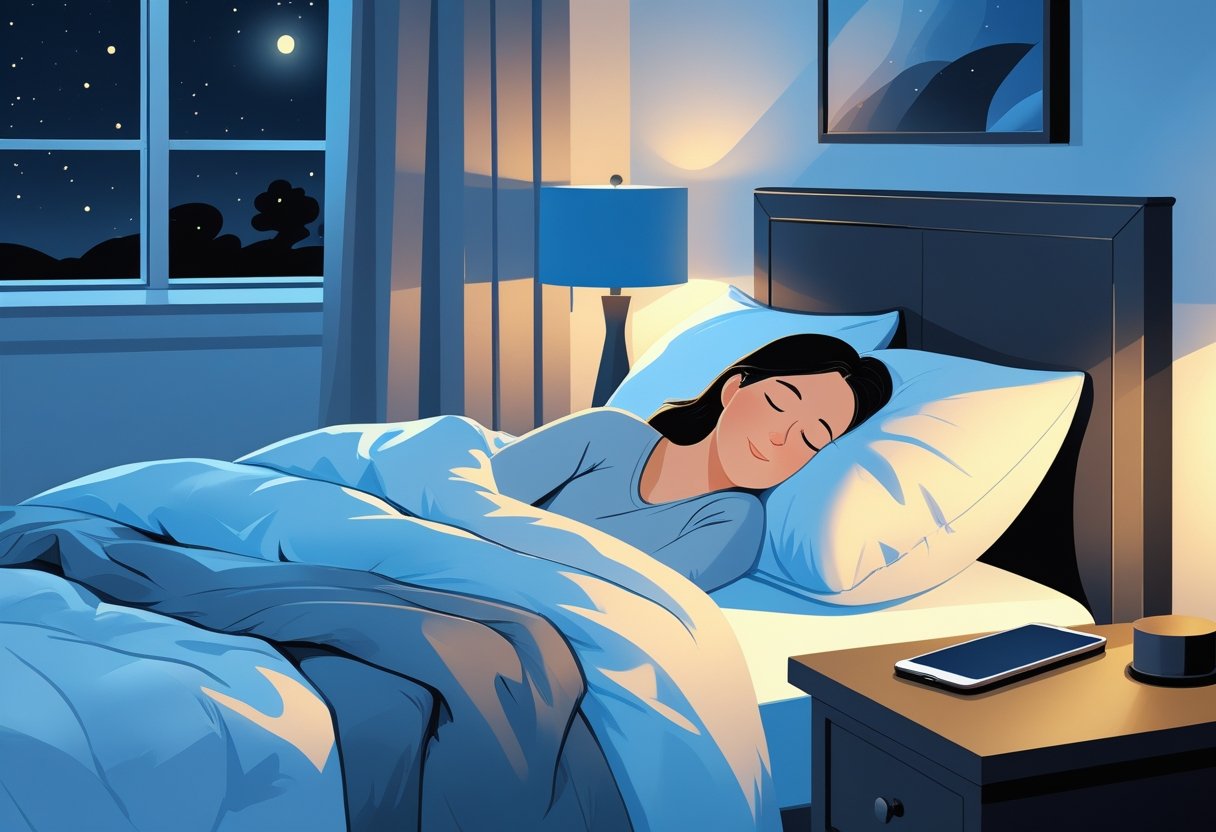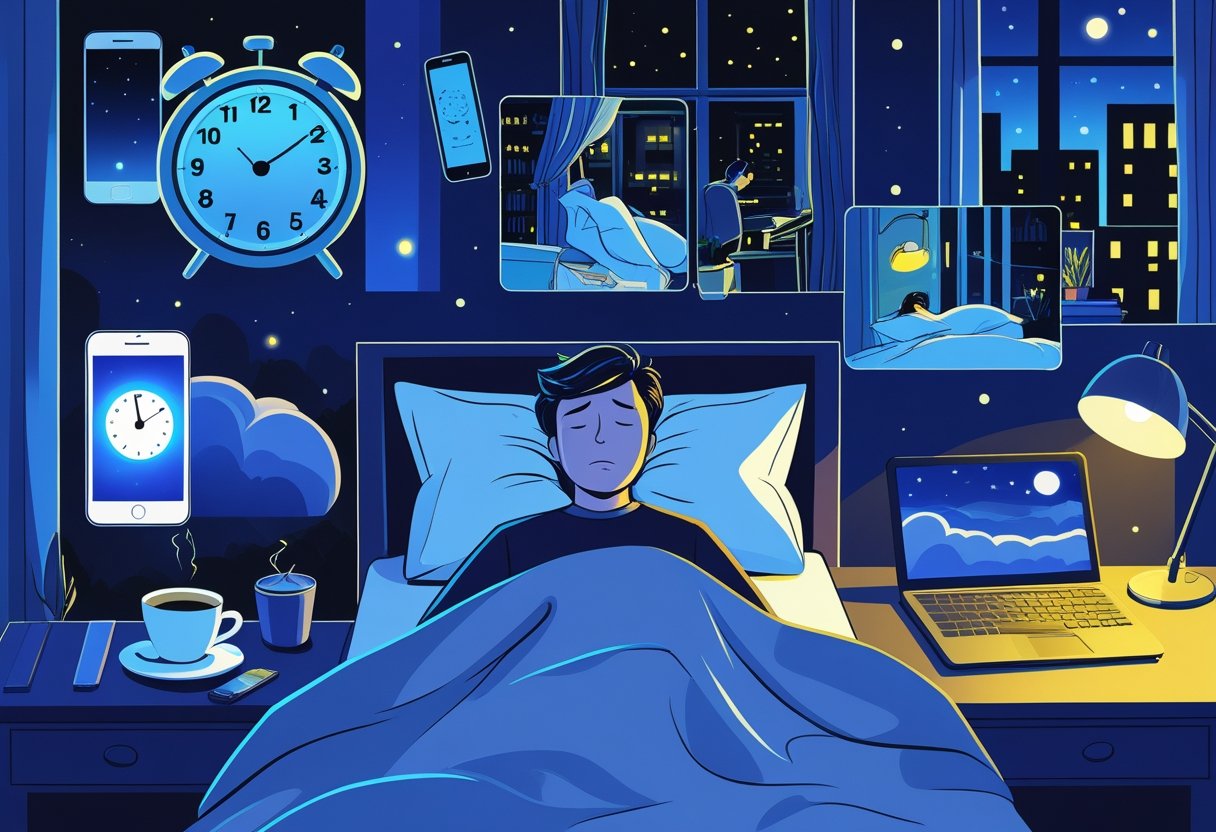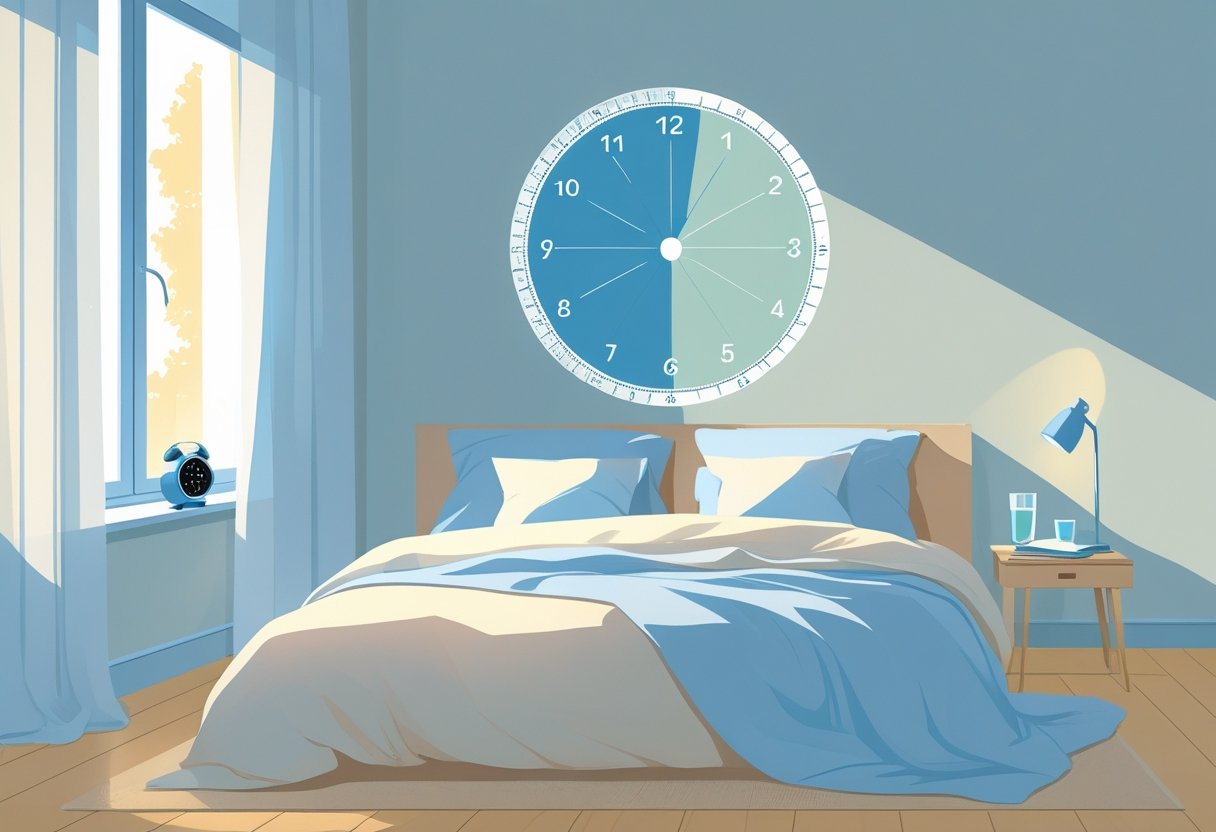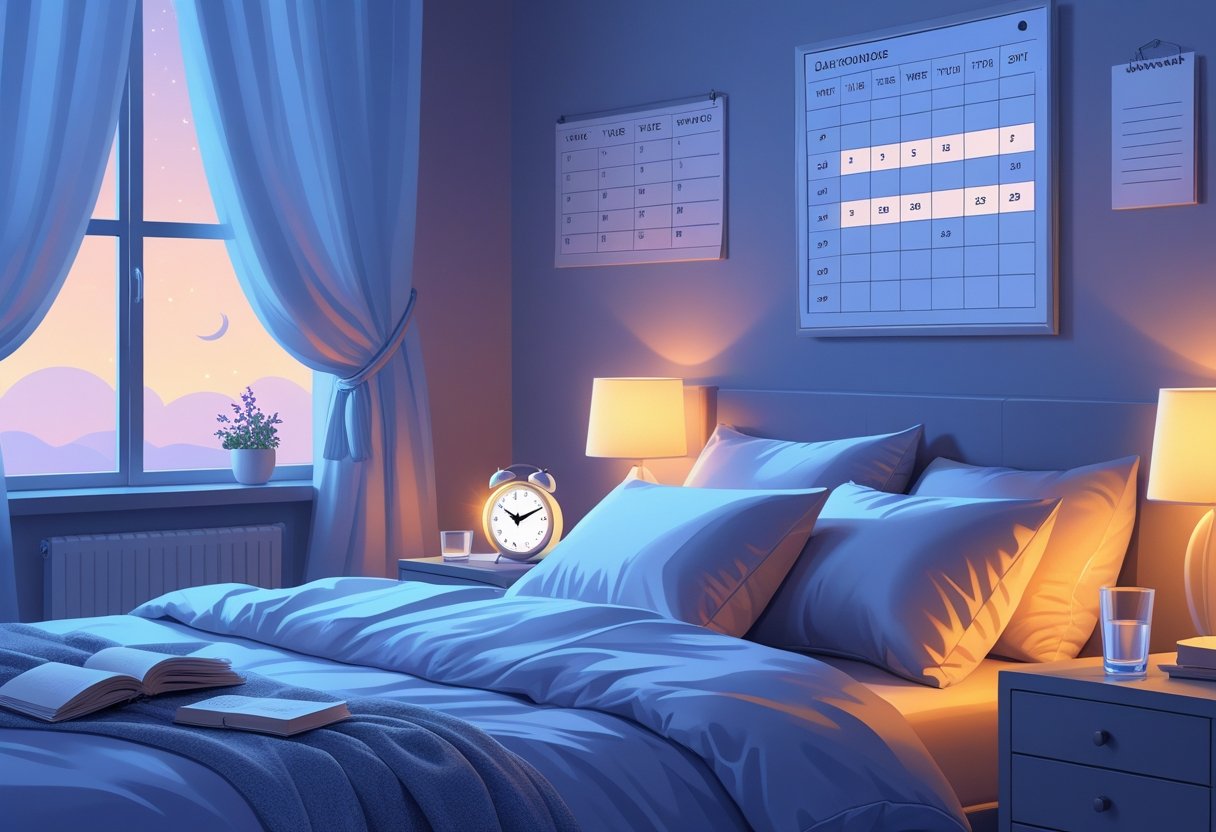Knowing the best sleep schedule depends largely on getting enough rest and sticking to consistent bed and wake times each day. A regular schedule that allows 7 to 9 hours of quality sleep is essential for feeling refreshed and staying healthy, since it helps the body recover and function well during the day.
Many people face irregular sleep patterns caused by work demands, stress, or lifestyle choices. Yet building routine sleep habits boosts mood, sharpens focus, and supports overall wellbeing. The ideal sleep timing differs for everyone, though keeping a steady routine matters most for maintaining good sleep quality.
Learning how to set and follow a consistent schedule helps anyone improve their sleep health. It requires both short-term adjustments and long-term habits to restore disrupted routines and promote better rest night after night.
Key Takeaways
- Consistent bed and wake times improve sleep quality.
- Irregular schedules lead to tiredness and reduced focus.
- Long-term habits build steady, healthy sleep patterns.
- A mattress that suits your sleep position while providing proper support and cooling significantly enhances sleep quality and helps maintain a consistent and healthy sleep schedule.

What Is the Best Sleep Schedule?

A good sleep schedule depends on the body’s natural cycles, the right timing for going to bed and waking up, and each person’s unique sleep needs. Aligning these factors helps people sleep well and wake up feeling refreshed each day.
Understanding Circadian Rhythms
Circadian rhythms are 24-hour cycles in the body that dictate when people feel awake or sleepy. These rhythms respond mainly to light and darkness. When it becomes dark, the body releases melatonin, a hormone that signals it is time to rest.
Keeping a regular sleep and wake time helps maintain steady circadian rhythms. Frequent schedule changes confuse these rhythms and often lead to difficulty falling asleep or waking up feeling tired. Getting daylight exposure in the morning resets the circadian clock. Waking up early and spending time in sunlight supports better sleep later on. The best sleep schedule works with these natural patterns.
Optimal Bedtimes and Wake Times
Most adults need between seven and nine hours of sleep each night. The ideal bedtime varies for everyone but typically falls between 9 p.m. and 11 p.m. Waking up at the same time every day helps maintain good sleep quality.
Going to bed and waking up consistently, even on weekends, supports a healthy routine. Irregular sleep schedules can leave people feeling groggy or unfocused during the day. Choosing a fixed wake time and counting back seven to nine hours determines the ideal bedtime. For example, those who need to wake up at 6 a.m. benefit most from sleeping between 9 p.m. and 11 p.m.
Individual Differences in Sleep Needs
Not everyone requires the same amount or timing of sleep. Age plays a key role; teenagers and children need more sleep than adults, while older adults often need slightly less but still benefit from consistent sleep schedules. Some people are naturally “morning larks” or “night owls.” Morning larks feel most alert early and prefer earlier bedtimes, whereas night owls stay up late and wake later. Either pattern can support healthy sleep when the schedule matches personal preferences.
Health conditions, work commitments, and lifestyle choices also influence ideal sleep times. Paying attention to how rested and alert someone feels during the day helps reveal whether their sleep schedule meets their needs.
Why a Consistent Sleep Schedule Is Important
A consistent sleep routine shapes many parts of a person’s health. It affects mood, body functions, and how well the brain works. These areas connect closely to how regular sleep improves overall well-being.
Impact on Mental Health
Keeping a regular sleep schedule helps reduce stress and anxiety. If sleep times vary, the body’s natural clock gets confused, which causes mood swings and irritability. People with consistent sleep patterns face fewer mental health problems.
Lack of routine can lead to poor emotional control and raise risks for depression. Regular sleep helps the brain manage emotions better, which brings more balance and calm. This can improve daily interactions and overall peace of mind.
Physical Health Benefits
A consistent sleep schedule supports the immune system since it helps the body repair itself. Regular sleep timing lowers risks for heart disease and diabetes. The body’s hormones also stay balanced, which affects appetite and energy levels.
When sleep times shift, it can cause problems like weight gain and fatigue. Regular sleep helps keep blood pressure and blood sugar levels steady. These physical benefits add up to a longer and healthier life.
Cognitive and Performance Improvements
Regular sleep sharpens focus, memory, and decision-making skills. People who go to bed and wake up at the same time learn and solve problems more easily. This stability also reduces daytime sleepiness and mental fog.
Performance at work or school improves with a consistent sleep pattern. The brain clears out toxins during sleep, which sharpens thinking and creativity. Irregular sleep makes it harder to retain information and stay alert.
Sleep Consistency Benefits:
- Mental Health: Reduced anxiety and better mood
- Physical Health: Stronger immune response and improved heart health
- Cognitive Performance: Sharper memory and increased alertness
Maintaining the same sleep schedule matters for mental balance, physical well-being, and sharper brain function.

Common Reasons Sleep Schedules Become Disrupted
Sleep schedules can be disrupted for many reasons, such as daily habits or external changes. Stress, work hours, travel, and lifestyle choices all contribute to making a person’s sleep pattern irregular or uneven.
Lifestyle Factors
Daily habits like screen use, diet, and stress directly affect sleep timing. Using phones or computers before bed exposes the eyes to blue light, which delays sleep. Caffeine or heavy meals late in the day also interfere with falling asleep.
Emotional stress and anxiety often cause people to think, “my sleep schedule is messed up.” Worry or tension makes it difficult to relax enough to sleep at the usual time. Inconsistent wake-up times on weekends or frequent daytime naps disrupt the body’s internal clock. Keeping a steady routine supports better sleep quality and boosts morning energy.
Travel and Time Zone Changes
Crossing time zones causes jet lag, which confuses the body’s natural clock. This leads to sleepless nights or feeling tired at odd times. Recovery varies depending on how many time zones someone crosses and how quickly they adapt. Jet lag symptoms include difficulty falling asleep, waking earlier or later than normal, and daytime fatigue. Adjusting to the local time by getting sunlight during the day and skipping naps helps reset the sleep cycle sooner.
Frequent travelers for work or leisure may find their sleep schedule disturbed more often, which requires extra effort to keep a consistent routine while away from home.
Shift Work and Irregular Hours
Working nights or changing shifts forces the body to stay awake during natural sleep hours. This reverses or fragments the normal sleep-wake pattern. Many shift workers report poor sleep quality and persistent tiredness.
A key challenge is that the body’s internal clock is wired to sleep when it’s dark and stay active when it’s light. Working overnight opposes this natural rhythm, usually creating a mismatch in sleep timing. Managing this includes setting up a dark, quiet bedroom during the day, installing blackout curtains, and keeping a regular routine even on days off. Without these steps, a shift worker’s health and alertness may decline over time.

How to Fix Your Sleep Schedule
Fixing a sleep schedule takes steady effort and careful habits. Adjustments should occur slowly and consistently so the body adapts. Daily activities such as winding down before bed and getting morning light are important in resetting the internal clock.
Gradual Adjustments
Fixing a sleep schedule works best when bed and wake times shift by small increments. Moving them 15 to 30 minutes earlier or later every few days helps the body adjust without causing stress or confusion. It is important to stick to the new times every day, including weekends. This consistency strengthens the new pattern and resets the sleep-wake cycle effectively.
Trying to change sleep times by several hours at once often leads to tiredness and trouble falling asleep. Gradual changes allow the body’s circadian rhythm to reset naturally, which improves overall sleep quality.
Setting a Regular Bedtime Routine
A clear, calming routine before bed signals the body to get ready for sleep. Activities like reading, stretching, or listening to quiet music can help. Avoid screens at least 30 minutes before bedtime since blue light disrupts melatonin production, which is necessary for falling asleep.
Keeping this routine at the same time every night trains the brain to link these activities with sleep. Over time, it becomes easier to fall asleep and stay asleep, which is key to fixing a sleep schedule.
Morning Sunlight Exposure
Morning sunlight resets the internal clock by signaling the body it is time to wake up. Exposure to natural light for 20–30 minutes each morning boosts alertness and regulates melatonin levels. Spending time outside soon after waking or opening curtains to let sunlight in supports this process.
Using this method consistently aligns sleep schedules with natural day-night cycles, which makes falling asleep at night and staying awake during the day much easier.

Quick Fixes and Reset Techniques

Making sharp changes to a sleep schedule proves tricky, yet certain methods aim to realign the body clock quickly. These approaches involve immediate shifts or staying awake through the night, each providing clear steps and noticeable effects.
Resetting Your Sleep Cycle in One Night
Resetting a sleep cycle overnight requires going to bed and waking up at specific, new times to shift the internal clock. The key lies in avoiding naps the following day and ensuring a full night’s sleep, ideally 7-9 hours, at the new bedtime.
Light exposure plays a major role. Morning sunlight helps the body wake up, while reducing light before bed signals it to sleep. Some people turn to melatonin supplements to encourage sleep onset, though these should be used carefully.
Maintaining consistency over the next several days remains essential. Keeping the new schedule daily allows the body to adjust, which makes it easier to stick with regular sleep habits long-term.
Pulling an All-Nighter: Pros and Cons
Pulling an all-nighter to fix a sleep schedule involves staying awake through the night to become tired enough for an earlier bedtime. This method can work for some but carries significant risks.
Pros:
- Forces a reset by skipping unwanted sleep times.
- Could align with a new schedule if followed by regular bed and wake times.
Cons:
- Causes sleep deprivation and potential fatigue the next day.
- May reduce focus, mood, and physical performance.
- Can backfire if naps or early sleep occur the following day.
Experts recommend approaching the all-nighter method with caution. It doesn’t suit everyone and may fail to produce lasting benefits without consistent follow-through.
Long-Term Strategies for Maintaining a Healthy Sleep Schedule
Maintaining a consistent sleep schedule takes daily habits that align with regular sleep and wake times. Light exposure and balancing social or work demands both play a key role in keeping the body’s internal clock on track. These factors combine to improve sleep quality over time.
Sleep Hygiene Tips
Good sleep hygiene involves creating a routine that signals the body when to rest. This means going to bed and waking up at the same time each day, including weekends. Heavy meals, alcohol, and caffeine should be avoided for at least four to six hours before bedtime to limit sleep disruptions.
The bedroom must stay cool, quiet, and dark to encourage falling asleep more quickly. Reducing screen time before bed prevents blue light from delaying rest. Many people rely on relaxing activities such as reading or light stretching to signal it’s time to wind down.
Managing Light Exposure
Light sets the body’s internal clock, known as the circadian rhythm. Morning daylight cues the brain that it is time to wake up. Spending time outside or near windows during the day helps maintain alertness and supports better sleep at night.
Bright and blue light in the evening should stay limited. Using dim lighting and turning off screens an hour before bed allows the brain to prepare for rest. Blackout curtains or eye masks block artificial light at night that could disturb sleep.
Handling Social and Work Commitments
Social events and work demands often disrupt sleep patterns. Planning set wake times reduces the impact of late nights or early appointments. Setting clear work hours and boundaries with others preserves sleep time.
For shift work, adjusting sleep and wake times gradually before schedule changes reduces confusion. Short naps during breaks can help, though they should never replace full sleep periods. Prioritizing sleep in daily plans sustains energy levels and supports overall health.

When to Seek Professional Help
Someone should see a doctor if sleep problems persist for more than a few weeks. Trouble falling asleep or staying asleep regularly disrupts daily life and could signal an underlying issue.
If someone feels extremely tired during the day or drifts off at unusual times, it may point to a sleep disorder. Loud snoring, gasping for air during sleep, or waking up choking also serve as warning signs.
Other symptoms to look out for include:
- Difficulty concentrating
- Mood changes such as irritability or depression
- Frequent headaches or body pain
These signs indicate that sleep is seriously affecting health.
If lifestyle adjustments, like sticking to a regular sleep schedule or cutting down on caffeine, fail to improve sleep, professional advice becomes necessary. A sleep specialist diagnoses conditions such as insomnia, sleep apnea, or restless leg syndrome.
Acting promptly is important since untreated sleep problems can damage both physical and mental health.
The Perfect Mattress for Your Ideal Sleep Schedule
Sleep problems follow a concussion and can persist for weeks or months. These issues influence how well the brain heals and how quickly recovery occurs. Understanding the connection between concussion and sleep guides better care and improves outcomes.
Recovery Timeline and Sleep Quality
Most people recover from a concussion within two to four weeks. During this period, sleep patterns frequently change, leading to difficulty falling or staying asleep. These disruptions delay healing because the brain depends on sleep for repair.
If sleep problems continue beyond a month, they may indicate post-concussion syndrome. This condition involves ongoing symptoms such as headaches, dizziness, and persistent sleep disturbances. Patients with chronic sleep troubles face a higher risk of slower recovery.
Monitoring sleep quality throughout recovery provides doctors with insight into a patient’s progress. Poor sleep may predict longer symptom duration and greater impact on daily life.
Managing Ongoing Sleep Issues
Long-term sleep problems after concussion require careful management. Avoiding sleep medications remains preferable since these drugs might cause side effects or worsen symptoms over time. Instead, methods like good sleep hygiene and light therapy offer help. Establishing a calm bedtime routine, reducing screen time, and keeping consistent sleep hours enhance sleep quality. In some cases, cognitive behavioral therapy for insomnia (CBT-I) delivers positive results.
Doctors often investigate other causes of sleep disturbance before attributing it solely to concussion. Addressing sleep problems directly increases the chance of full recovery and lowers the risk of chronic symptoms.

Frequently Asked Questions
Sleep duration, timing, and quality all have important roles in health and daily function. Understanding how to calculate sleep cycles, align bedtime with natural rhythms, and meet cognitive needs can improve rest. Certain hours at night provide deeper restorative sleep, which affects how alert and focused a person feels during the day.







